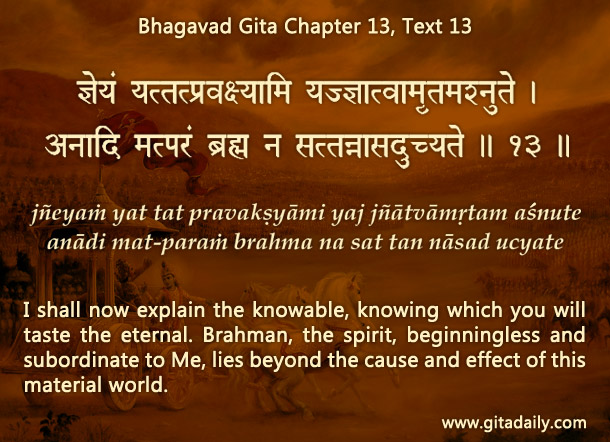
“It tastes like nectar,” people say when something tastes delicious. This usage, wherein nectar is compared to a thing, often makes people assume nectar to be a thing to be ingested. But the reality is different.
The standard Sanskrit equivalent of nectar is ‘amruta,’ which has two meanings: nectar and immortality. The two meanings are related in two ways.
Firstly, immortality is like nectar. People often ascribe this nectar-like nature of immortality to the absence of the poison-like misery of death. Actually, immortality is nectarean not just due to what is absent in it, but much more due to what is present. Life at the immortal level is filled with the ecstasy of love between the supreme spiritual being Krishna and his pure devotees. That love is existence’s ultimate nectar, life's sweetest truth.
Secondly, nectar grants immortality. People often assume this nectar to be the heavenly beverage known as soma-rasa. However, that nectar only prolongs the body’s lifespan, doesn’t perpetuate it, because all material things are intrinsically, inalterably temporary. Nothing can make the material eternal.
The nectar that actually grants immortality is not a material thing to be ingested – it is a spiritual truth to be realized, relished and lived. The Bhagavad-gita (13.13) asserts that one who knows the Absolute Truth attains immortality. The precise word used is jneya, that which is to be known. While everything can be treated as an object of knowledge, Gita wisdom focuses on the most fruitful object of knowledge. That object is Krishna, because when we truly know him, we fall in love with him. When we love Krishna more than anything else, he naturally transports us to his immortal abode where we can continue that divine love forever.
Explanation of article:


Dear Prabhu,
Hare Krsna! Pamho. Agtsp! Thanks for yr wonderful writings!
One feedback for yr kind consideration & hopefully implementation..
As can be seen in the image that goes along with this post, Srila Prabhupada uses “Me” and not “me” in pronouns which refer to The Supreme Personality of Godhead Lord Sri Krishna. Your article would be that much more relishable if you too followed that standard and used He & Him in reference to our revered Lord. I do believe there are several specific letters by Srila Prabhupada on this editing policy.
For your kind consideration, please.
Your humble servant,
In service of Sri-Sri Guru-Gauranga,
dina
Thank you for your suggestion, which I have got a few times before. I have responded in audio and text here:
http://www.thespiritualscientist.com/2012/09/why-do-you-use-the-lower-case-pronoun-for-god-he-instead-of-he-isnt-it-disrespectful/